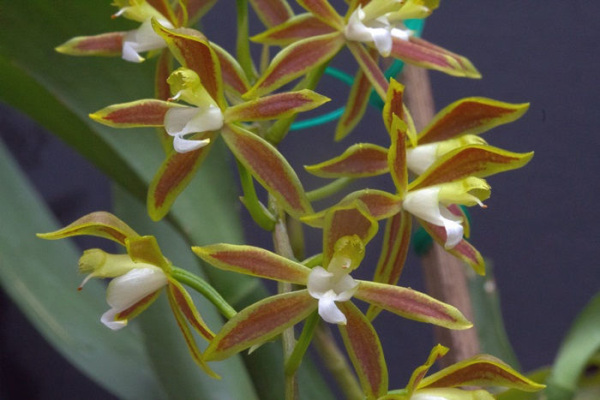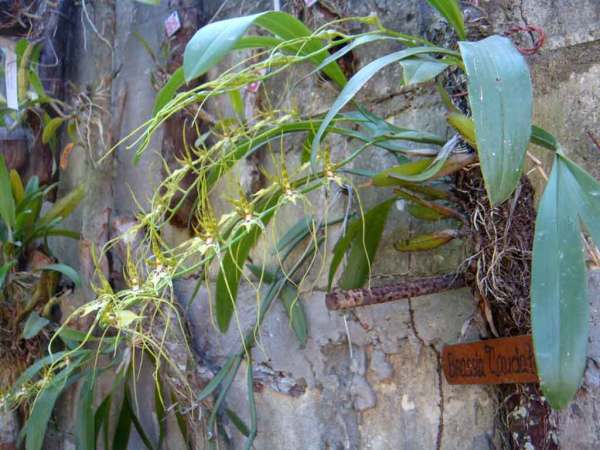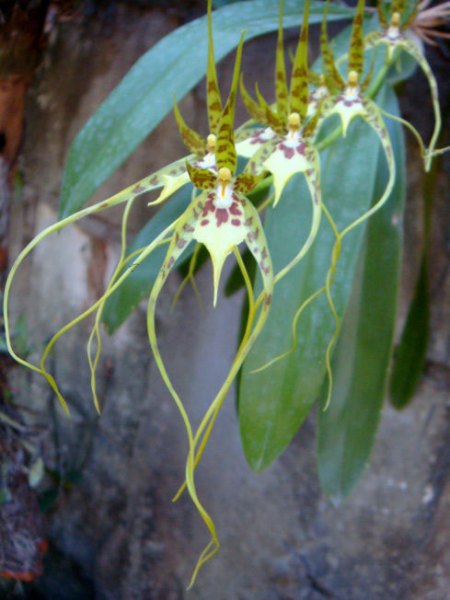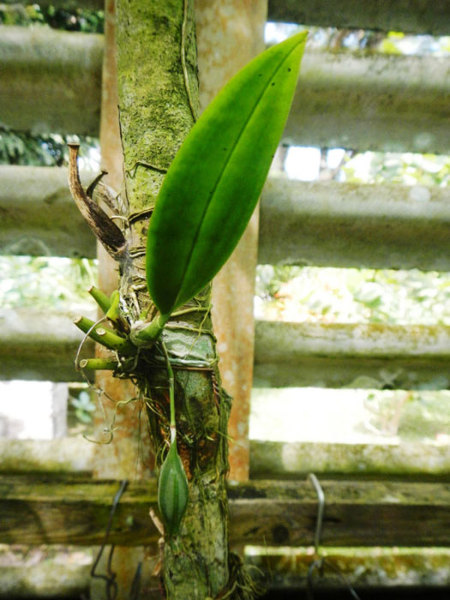by Dennis Giardina
We walked down the same orchid-laden aisle of the greenhouse that we had walked down in October of 2012. To our great surprise and delight we were greeted by a colony of Bulbophyllum pachyrhachis, rat-tail orchids in full bloom, one of them bearing a swelling seed capsule! I don’t know about Mike but I couldn’t believe my eyes. No, I do know about Mike because I was standing right next to him. There were no “Touchdowns!” or any other excited exclamations. Our loquacious Park Biologist Mike Owen was speechless and so was I. I pounded his shoulder a couple of times as if to say, “Mike, can you believe this!”
We started to take pictures and then Dr. Rolando Perez, our host and the Director of Science of Soroa Botanical Garden, signaled to us to follow him. We did and what he showed us blew us away. There, dangling from a chunk of wood was Epidendrum acunae. In the space of about three and half minutes, we found both of Fakahatchee’s lost orchids! Mike and I attended the Orchid Restoration Conference, hoping only to tell the Cubans about our desire to find the lost orchids. Neither one of us expected to actually do it!
I went back to the Orquideario in May of 2013. I was very cryptic in my E-mail correspondence with Rolando during the intervening months. Although I never reminded him specifically to do so, I thought I made it abundantly clear to him before I left that I was coming back to collect that rat-tail seed capsule. I should have just asked him for it when we were there in October because I know he would have given it to me, but I erred on the side of caution. Ultimately, he did not remember to collect my seed capsule and the tiny, shriveled up seed pod that I did bring back with me, did not contain any viable seeds.
Leading up to this trip, I kept my expectations very low. Good thing, because even though it was a few weeks later than when we were there the previous year, when we reached the group of rat-tail orchids, the one or two that were in flower did not have any seed capsules. We eventually made our way around the corner to inspect the Epidendrum acuane and we couldn’t find it. We spent an hour looking around the main greenhouse, then we searched several others and we never did find it. Rolando assured me that his daughter Yunelis would know where it was but for the moment, at least, this orchid was lost in Cuba as well!
During our search for the missing Epidendrum acuane, we came across two other notable species, Macradenia lutescens and Brassia caudata, Florida’s East Coast lost orchids. These two species were documented in the early part of the 20th Century, growing in a few of the larger tropical hammocks in the Eastern Everglades in Miami-Dade County. Soon thereafter they were over collected and by 1970’s, they were gone.
The Brassia caudata was in flower. Its flowers are borne on a long spike. The tips of the sepals and petals extend into thin, trailing appendages that give them a distinctive, spidery appearance. Brassia must also mimic the scent of spider, because it has been observed in Florida to be pollinated by the tarantula hawk wasp. Many orchids have developed complex relationships with their pollinators, intimating an “awareness” that would seem beyond the ability of sightless, mindless plants. Some orchid flowers mimic the form and scent of a receptive female insect and are pollinated by the repeated probing of an excited male of the same species in a manner called “pseudo copulation.”
Brassia’s spider shape and smell deceive the big wasp into attacking the flowers, grabbing and trying to sting them, in the process transferring pollen from one flower to another in a manner called “pseudo depredation.” Macradenia lutescens is a small epiphytic orchid that has a long, cascading flower spike that supports a dozen or more multi-colored flowers that are somewhat variable in color but always quite lovely.
On our way out the greenhouse door, I noticed that one of the Macradenia orchids had a nice, unopened yet quite ripe, seed capsule. I was focused on the Fakahatchee lost orchids but our broader plan has always been to bring back the Everglades lost orchids as well. So, even though I imagined that those two species would come later, I felt that life was offering me a gift and it would be in bad taste not to accept it. We promptly snipped it off and I nestled it in the pocket of my camera case.
When I got home, I took out the seed capsule and examined it. It was still green and seemingly as tough as a super ball. I remember thinking that I could whip it against a wall or the floor and nothing would happen to it. Surely it could take the jostling of the mail bags and boxes that I imagined it would be subjected to by the US Postal Service. I wrapped the seed capsule in an envelope and then put that folded wad into another envelope addressed to Matt Richards at Atlanta Botanical Garden. A few days later I got an E-mail from Matt saying,
I got the seed pod; unfortunately it went through the ‘smasher’ at the post office. I will attempt to salvage something but it doesn’t look too good at this point. Sorry for the sad update.
I had no idea that my letter would go through the metal rollers of the mail sorting machine. If I had, I would have put it in a box. I felt so stupid, then depressed for a week.
Mike and I have been joking that this project, and our desire to bring back Fakahatchee’s lost orchids, is a “Quixotic quest,” and that may be so. We couldn’t have picked a less accessible country in the world in which to find anything, except maybe North Korea. Somehow I have been slipping through a worm hole in the U.S. – Cuba cold war continuum, but it’s anyone’s guess how long it will remain open. Now as I prepare for my fourth trip to Cuba, a place that only a few short years ago I didn’t even think possible to visit, I have done everything possible to ensure that there will be seeds of the lost orchids waiting for me. It has been said that fortune favors the bold, but it has also been said that no good deed goes unpunished. Stay tuned…
Dennis Giardina is the Everglades Region Biologist for the Florida Fish and Wildlife Conservation Commission and was formerly the Park Manager of Fakahatchee Strand Preserve.





